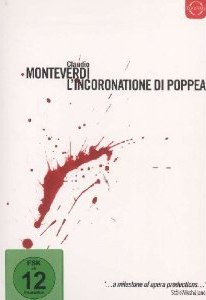 |
 |
|


alternatively
MDT
AmazonUK
AmazonUS |
Claudio MONTEVERDI
(1567-1643)
L'Incoronazione di Poppea
 Birgitte Christensen (Poppea), Jacek Laszczkowski (Nero), Tim Mead
(Ottone), Marita Sølberg (Virtú/Drusilla), Patricia
Bardon (Ottavia), Amelie Aldenheim (Amore), Ina Kringlebotn (Fortuna),
Tone Kruse (Nutrice), Giovanni Battista Parodi (Seneca), Emiliano
Gonzalez-Toro (Arnalta), David Fielder (Valetto), Magnus Staveland
(Lucano)
Birgitte Christensen (Poppea), Jacek Laszczkowski (Nero), Tim Mead
(Ottone), Marita Sølberg (Virtú/Drusilla), Patricia
Bardon (Ottavia), Amelie Aldenheim (Amore), Ina Kringlebotn (Fortuna),
Tone Kruse (Nutrice), Giovanni Battista Parodi (Seneca), Emiliano
Gonzalez-Toro (Arnalta), David Fielder (Valetto), Magnus Staveland
(Lucano)
Orchestra of the Norwegian National Opera/Alessandro De Marchi
rec. live, Norwegian National Opera, 2010
Director: Ole Anders Tandberg
TV and Video Director: Anja Stabell, Stein-Roger Bull
Sound: PCM Stereo
Picture: NTSC/16:9
Region: 0 (worldwide)
Subtitle languages: Italian, English, German, French, Japanese,
Norwegian
 EUROARTS 2058928
EUROARTS 2058928  [180:00]
[180:00]
|
|
|
Is this an opera performed for an audience, or one performed
strictly for TV viewers? At the very beginning of the film,
you see conductor Alessandro De Marchi enter the theatre, and
start leading the musicians in the pit, but once the camera
switches to the stage, everything changes. The video becomes
fuzzy, the colours all disappear, with the exception of reds,
and the singers seem to ignore the existence of an audience.
The information about this recording says that it is "based
on a performance", without providing any more detail.
In essence, it seems that the performance itself was filmed
just for the original TV broadcast and for its release on DVD
and Blu-Ray. The singers often look directly at the camera,
and there are many close-ups, and few shots of the entire stage.
In addition, at times it seems that some of the singers are
lip-syncing.
The video features many effects, such as blurring around characters
as they move, freeze-frames, slow-motion shots, "replays" and
others. All in all, this is an interesting approach. However,
the de-saturated colour makes the visuals a shade monotonous.
At least until the stage is covered in blood.
The singers are a mixed bag. Tim Mead has good technique, but
is unconvincing as Ottone, but Patricia Bardon's powerful voice
makes a wonderful Ottavia. Amelie Aldenheim, who only has a
few singing parts, has an attractive voice, but she seems to
try too hard. Male soprano, Jacek Laszczkowski, as Nero, has
trouble hitting the highest notes near the end of the opera.
One problem with the voices in general is that they were most
likely recorded in post-production. This allows the mix to make
the voices much more prominent than they would be if recorded
during a performance. It also explains the lip-syncing. Their
being too close and overwhelming the music tends to be disturbing.
In the end, this staging of an opera for television, seemingly
designed to attract fans of The Sopranos (the other kind
of sopranos), alienates by its choices of starkness and violence.
The music is well performed, but with the singers' voices so
prominent viewers are prevented from appreciating the orchestra.
While the idea of making a TV production of an opera is certainly
laudable, the choices in this production seem to be those that
would push away many viewers. It seems as though everything
in the direction and staging is designed to be an "effect",
turning the characters into mere puppets. The excessive close-ups
suggest that each character is somehow separate from the broader
production, as though they were all soloists, each working on
their own. The bloodiness at the end of this opera is also devoid
of any feeling. It is there for shock value - hence the overall
de-saturation of colours, except for red.
In the end, this is an un-memorable performance. It is very
de-personalising, with the starkness of the production literally
draining the colour out of the work. The idea of adapting an
opera for television in this manner is interesting but the specific
approach used here doesn't work for me.
Kirk McElhearn
see also review by James
Potter
|
|












